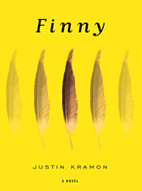 Author
of the Month
Author
of the Month
Justin
Kramon [may
2011]
Chosen by MyShelf.com reviewer Jen Oliver
Justin Kramon is a fresh voice in the literary field with his debut novel, Finny, that came out July 2010. He is able to mix humor with serious events in his novel, Finny. He has been successful in getting several short stories of his published. He has taught creative writing at Gotham Workshop in New York City.
Interview:
Jen: How long were the characters of Finny in your head?
Justin: I started writing the novel several months after I began working with the characters. That might sound strange. I didn't have them tied up in my closet or anything, but I was taking notes about them, writing scenes, and just thinking about how their stories fit together. Very little of that work made it directly into the final novel, but it gave me a lot of information and background when I actually found the story and voice of the novel. Some reviewers have talked about the detailed quirkiness of all the characters in the book -- a narcoleptic pianist, a former stripper turned hairdresser, a seductive New York heiress, etc. -- and I think that came from taking a lot of time thinking about them off the page, what their lives had been like before they met each other, strange habits they might have, all that.
 Jen:
How long did it take you to write the novel?
Jen:
How long did it take you to write the novel?
Justin: I wrote the first draft in a little less than a year, which is very fast for me. It took me a while to find the right voice for the book, and then after I finished writing a draft, I spent at least 18 months editing it. That's all just to say that the writing process was much longer than the actual time I spent writing a draft.
Jen: You've stated that you write about what you know...why did you think that you could tackle a female lead character?
Justin: When I started writing fiction, I had a teacher who fed me that old adage, "Write what you know." I've always been intimidated by that idea, because I don't think I know very much. So I wondered what I'd write about. In a sense, every writer can only write what he or she knows. What else would you write? You get this little fenced-in piece of property, your experience in the world, and that's the material you have as a writer. I think fiction has always been appealing to me, because the writer is looking for little gates out of his own property, into other people's lives. So while I agree that a writer has to "write what you know," my idea of what that meant changed over time. I don't think I necessarily "know" what it's like to be a woman, but I'm definitely curious about it. Finny and I share some things -- places where we've both lived, similar family structures, ideas about people's motivations, and a general sense of the world as being both a very funny and sad place to live -- so I tried to use those commonalities to help me understand the parts of Finny's life I haven't experienced. For a long time I had the idea that "writing what you know" meant that you had to know all the facts and details of a character's world; but I've found that what I know actually has more to do with emotions and psychology than facts, so I try to use that as best I can in my writing.
Jen: How long did it take you from idea to published book?
Justin: I started thinking about Finny in the summer of 2007. The book came out this past summer (2010). So that was about three years. I think it's really different for every writer and every book. I'm not sure there's any standard.
Jen: If you weren't writing, what would you be doing?
Justin: I enjoy cooking and playing piano, but I don't think I'm either good or passionate enough at either of those things to make a living at them. If I weren't writing, I'd probably go to school for a while. I'm pretty nerdy and bookish, and I think I'm socially awkward enough to be an academic. But I don't know what I'd be good at. I liked philosophy in college, but it's hard for me to imagine dedicating myself to that as a career. I was a pretty bad waiter and bartender. Maybe teaching. I found that fulfilling, and it was nice to have a captive audience. I mean, you can tell dozens of bad jokes and they just can't leave, especially if you lock the doors.
Jen: Who were your biggest influences and why?
Justin: As far as writers, for Finny my biggest influence was Charles Dickens. The idea for the novel was actually a re-imagining of David Copperfield, but told from the point of view of a contemporary young woman. My novel borrows a lot from Dickens's larger-than-life characters, structure, humor, social satire, and sense of both cynicism and sentimentality about people. I love those middle-period Dickens novels, and I was interested in what it would be like to write one of those typically male adventures from a woman's point of view. In the short stories I've written, I've gotten a lot from reading Alice Munro, Alice Adams, and William Trevor, among others.
Jen: You've managed to incorporate humor in some of the more serious scenes. How did you come about these scenes and did anyone tell you to edit them out (i.e. funeral scene)?
Justin: I was surprised about how much critics talked about the funeral scene when the book came out. It seemed some people loved it, and others were just bewildered by it. My sense is that the people who liked the book really enjoyed that scene. It's always interesting to me to surprise readers. It's part of what I love in my favorite books -- how they catch you off-guard. When a character close to Finny passes away, everyone is expecting a tragic scene, but I wrote this comic scene with two undertakers sneezing on each other and complaining about what a rotten marriage they have. It's funny to me, how selfishly wrapped up they are in the face of these other people's tragedy, but it's also a way of bringing out that tragedy, in contrast to the comedy. That's the cynical part I was talking about before, pointing out people's selfishness through comedy, which is something Dickens is great at. But then there's also a scene later in that chapter when Sylvan and Finny are laughing over the absurd way their father has died, and all of a sudden they start crying, which was a very moving and true moment for me, a moment of "writing what I know" about the world. That thin line between humor and sadness is very interesting to me.
I was never asked to edit out the scene. There was some talk about whether I went a little too far with it -- the undertakers get pretty insensitive by the end of the scene -- but after discussing it we all ended up agreeing it was part of the voice of the book, and in line with the vision I had. That's something that's very important to me, to be able to write in my own twisted style, with my own screwed-up sense of the world, since I feel that that's really all a writer can offer. Some people are bound not to like certain things, or be offended, or find some scenes strange, but part of having a voice as a writer is taking those risks and not doing what's expected of you.
Jen: I know that you've taught creative writing/short stories classes before. What is your preference of writing-short story or novel?
Justin: I love both. I really do. I'm not just saying that
to sound writerly. I get such different rewards from each. In a novel,
there's a pleasure in living in a world for such a long time, bringing
its characters to life, filling in all the details of the place. There's
also a lot of fun in the intricate structure of the plot over hundreds
of pages, having characters who come in and out of the story, incidents
that surprise you. In stories, I love the compactness of the feeling,
how you can create such a strong emotion and sense of a character in
such a short space, sometimes a few lines. It's amazing to me, and a
little magical. I'd love to be able to continue working in both forms.
Reviews:
Read Jen's Review of Finny
Websites:
2011's Honorary List
| Justin Kramon | Alan Jacobson | ||||
|
Rick Mofina |
|||||